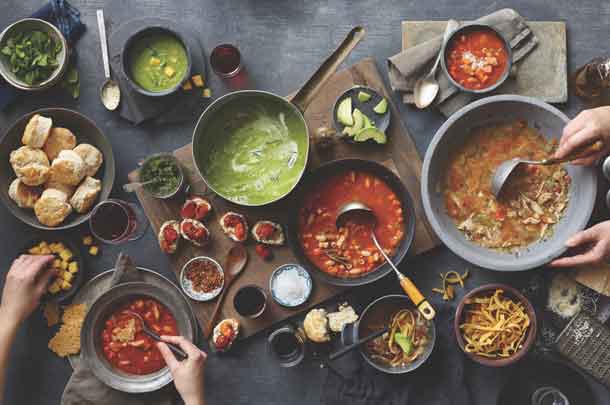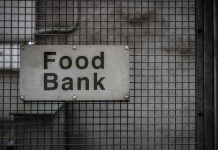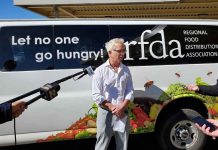

Let No One Go Hungry
THUNDER BAY – The Regional Food Distribution Association (RFDA) has a mandate to serve its member agencies across Northwestern Ontario; by acquiring and distributing food from all sources: to food banks, soup kitchens and other food-related programs. The amount and type of products distributed is based on availability, member’s need, the people they serve, and the capacity of members along with the RFDA to collectively source and participate in food collection. Some members have funding or other resources to draw upon. Our role is to be a central repository and distributor of charitable food giving; to the benefit of all members, fairly and reasonably. We recognize that inequities exist across the region. Some communities and members and non-members struggle with remoteness, competition for donor support, a shrinking economic base, and rising transportation costs. The RFDA continues to advocate for the rights of all persons to have access to healthy food in a dignified and respectful manner. We procure food to support nearly all food banks and feeding programs in Thunder Bay, and some across the region. We do not deny that much disparity exists regionally. Much work is ahead to level the playing field.
So how did we perform in 2017 as an member-centric organization amidst the not-for-profit funding competition and social service downloading? Did the RFDA move the bar higher, or contribute to any transformational quality of life change in Northwestern Ontario?
The following information and commentary is based on data collected from our members and an annual Hunger Count Survey administered by Food Banks Canada and the Ontario Association of Food Banks. We took some liberties to normalize the data, to provide a common denominator for comparison purposes. Each member organization operates, distributes food, and reports a little differently. This is our effort to look at the larger regional context; as we slowly move toward a more comprehensive understanding of our regional food insecurity.
2017 was both a year of struggle and accomplishment for the RFDA. Financial struggles continued to plague us and the entire charitable sector. It was only because of the formidable giving spirit of many Thunder Bay and Region donors that we went over the top in several key performance indicators. We give credit to our food retailers that are helping us move toward better pricing when we purchase; and for providing access to reclaimed or near end-of-shelf-life products; that might otherwise end up in landfills. We are grateful to the labour unions, industry partners, and individual philanthropists that helped us financially, and continue to share our vision for the future. Local and Ontario producers are becoming an increasingly vital link in our food supply chain. None of this would be possible without the support of local and national media attention. Spreading our message, allows us to work toward a better tomorrow; which includes a diminished dependence on charitable food banking.
I am confident that governments at all levels are finally speaking with one voice. The challenge continues to be the eradication of social injustice. The RFDA will use the following data to develop operational plans for 2018; to make yet more improvements in quality and capacity.
Main Messages
- RFDA distributed $2,590,441 in food value to its 44 member agencies; 32 of which are in Thunder Bay. There have been a few member exits, as well as a growing wait list for membership (locally & regionally). We have been at the $2M to $3M level for an number of years; with the most significant shift coming from: food quality, member service rationalization, and inventory management to reduce waste.
- RFDA Distributed an additional $568,831 in food value for: emergency food to remote First Nation communities, school nutrition programs, weekend youth hampers, a remote community renal food program, and assorted community engagement projects; for a total RFDA contribution of $3,159,272.
- Half of the value distributed ($1,571,110) was distributed to 8 of the larger food banks and feeding programs in Thunder Bay ($100K+); receiving incrementally between $101,360 to $347,600 value: The Gathering Place, Shelter House, RFDA Soup & Sandwich Program, Salvation Army, Redwood Park Opportunity Centre, Thunder Bay Food Bank, Grace Ministries, Dew Drop Inn. This represents an increase to this group of 25.6% over 2016
- Our members served 1,202,256 meals in 2017 based on modified hunger count data. It is an estimate based on information received and harmonized: meals prepared, served, average hamper size, family information reported, and volume of food distributed, including remote locations. When we extrapolated the data to include locations that lack service; we concluded that we are approximately 300,000 meals short across the region. Hunger still exists.
- RFDA members served 7,107 individuals monthly based on a National Hunger Count survey conducted in March every year, in conjunction with Food Banks Canada and the Ontario Association of Food Banks, plus local knowledge. Another 1,054 were served through special projects such as the CBC Sounds of the Season, our Renal Program, School Nutrition Funding, and emergency asks; for a total monthly RFDA Hunger Count of 8,161
- RFDA members with the 10 highest Hunger Counts serve 4,591 individuals monthly (ranging from 250 to 1,158 Hunger Counts); which represents a 64.6% concentration across the 44 RFDA members. The data supports our commitment to operationally shift some of our attention to the needs of larger food banks | food centres.
- The RFDA has followed a significant trend towards fresh and frozen foods. After years of criticism about handing out highly processed, packaged and canned foods; Food Banks Canada and the Ontario Association of Food Banks have assisted us to gradually shift towards healthier natural foods. Major retailers indicated a willingness in 2017 to explore the divertion of near-end-of-shelf-life foods from landfills. Conversations have started around re-purposing foods for charitable purposes. It involves safe food handling protocols, centralized pickups using refrigerated vehicles, carefully repackaging, freezing, or cooking foods destined for soup kitchens. The RFDA is proud to have achieved 21.39% distribution in the fresh or frozen category. Local farmers, gardeners, and organizations have all contributed to this milestone.
- There has been a quiet transformation within the RFDA membership in 2017. Some of our members have already made changes in the type of service offered, or have recently added new programs, intended to elevate people from “poverty to possibility”, if I may borrow United Way terminology. An Ontario Association of Food Banks report indicates that 90% of its direct members, and 60% of their affiliates provide more than just food bank hampers: gardens, counselling, education, referrals, housing support, advocacy. The list of added services is long. A Food Banks Canada document confirms that a diversity of services is tracked across Canada. One tenant of membership with Food Banks Canada or the Ontario Association of Food Banks is to work towards the end of food banking, in some capacity. Some of our members are embracing the concept by moving toward a hand up operating philosophy. With pride the RFDA can report that 6% of our members offer more than just food; in efforts to mitigate the impact of poverty and restore self-respect.
- Yes, we still have a need for typical food banks and soup kitchens. But even those can start the evolution towards a new model of service. I suspect that the region may soon be ready for a few new concepts, and some not-so-new. It is time that we begin to challenge the system.
- A food bank converted to a member owned food co-operative
- An indigenous food education and processing centre
- Satellite regional RFDA bulk food processing & distribution centres
- Collaborative social enterprise partnerships with First Nations
- We will continue to increase our collaboration in 2018 with producers, retailers, and business partners. The RFDA will start the conversation first with its own members: more healthy food, inventory systems, data collection, consistent standards of service, diversity.
RFDA 2017-Report Card by NetNewsLedger.com on Scribd




